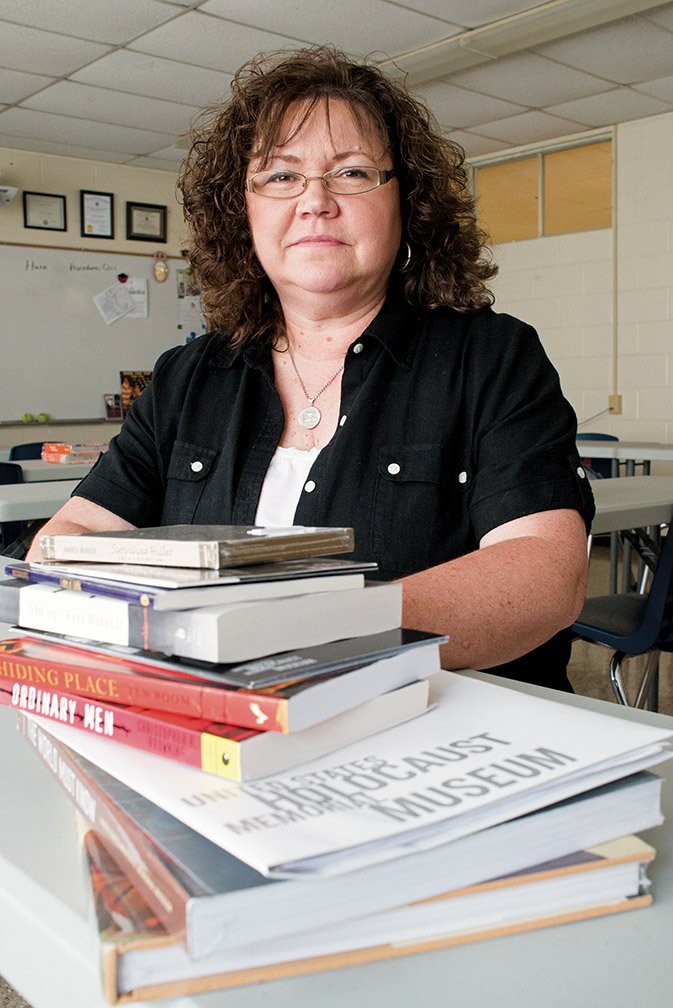CAVE CITY — Cave City Middle School teacher Trish Turnbough said she is always on the lookout for training and experiences that will help her in the classroom. Turnbough teaches social studies to sixth-graders, and she said it is important to her to balance educating her students with knowing what they can handle at their age.
This spring, Turnbough’s classes will study World War II, and she plans on utilizing some of the information she gathered at the Arthur and Rochelle Belfer National Conference for Educators at the United States Holocaust Memorial Museum to help students understand what happened during the Holocaust.
The conference took place this past July, and Turnbough said it was her first time to visit the museum in Washington, D.C. Conference attendees toured the museum once during the day, but they also got an exclusive opportunity to tour the facility when the doors were closed to the general public.
“When the museum was open, there were a lot of other people in there, but it was still very quiet,” she said. “The people were still very respectful. When it was closed, when it’s a limited number of people in there, there were times I was in different parts of the museum, and I would be the only person around. It was very powerful.”
One room in the museum holds the Tower of Faces, a collection of portraits of residents from a small town near the border of Poland and Lithuania. In two days, the Nazis eradicated the Jews and destroyed 900 years of Jewish heritage in the town. Another room in the museum shows a model of the gas crematorium at Auschwitz, complete with small figurines symbolizing the people killed there. Another room holds 4,000 shoes that once belonged to people killed in the Holocaust. The shoes on display are a fraction of those found at the Majdanek killing center after the Nazis were defeated.
“It’s a lot to take in,” she said.
Turnbough said the up-close experience in the museum helped her have a better understanding of the Holocaust, but being able to listen to and meet with Holocaust survivor David Bayer gave the trip a much deeper meaning.
“In talking to him, one person asked if there was one thing we should take back and share with our students, what should it be?” she said. “He thought a minute and said, ‘Love your neighbor.’ It’s so simple, yet it’s so powerful, too. Even in a classroom, I started pairing the students up and telling them they are going to have to help each other. A lot of times it might not be someone they might normally want to do that for, but I try to encourage that.”
When World War II comes up in Turnbough’s classes later this year, she said, she plans to share her experiences from this summer, but she also intends to emphasize how important primary sources are when it comes to learning about history.
“I want them to know to be looking at letters, looking at diary entries,” she said.
Sixth-graders usually come around to asking “why” things did or did not happen, Turnbough said. When students ask why it seems that many people did not step up and defend Holocaust victims, she said she plans to use Bayer’s encouragement to “love your neighbor” as part of the answer. Just like it was important for people to stand up and defend the Jewish people during the Holocaust, it’s important for students to defend others against bullying.
“That’s one of the connections I hope to make,” she said, “On their level, we try to do a good job avoiding bullying, but sometimes it happens. Something as simple as that — if you don’t keep it in check, it could continue to grow.”
The conference this summer was not Turnbough’s first time to meet with Holocaust survivors. She has participated in Black River Technical College’s Holocaust survivor series for years. She said that in the past few years, she has taken with her students from the history club she runs at the middle school.
“I tell my kids they are privileged they are able to go and listen to this source,” she said. “It’s not going to be long before they are not going to be around.”
Cave City Middle School has been helpful when Turnbough wants to pursue extra educational opportunities such as the conference in Washington and the series at Black River Technical College, she said, and that has made a difference in what she is able to bring to the classroom.
“I am really fortunate that I work at a school that supports me,” she said.
Financial support for Turnbough to attend the conference this summer came from an Arkansas Humanities Council grant, as well as a scholarship from the Arthur and Rochelle Belfer National Conference for Educators.
Staff writer Angela Spencer can be reached at (501) 244-4307 or aspencer@arkansasonline.com.
